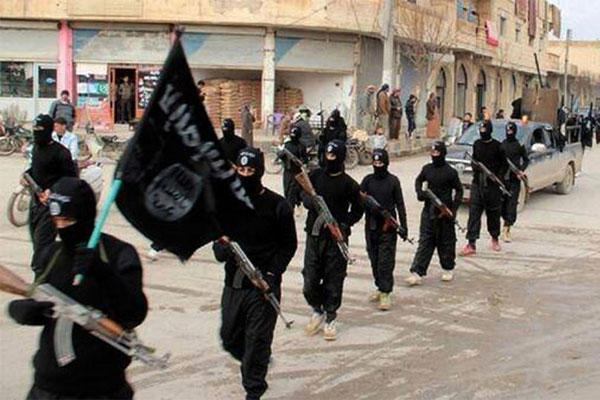United Nations Ambassador Samantha Power said Sunday that it was "totally fair, totally fair" to question the worth of the entire $500 million U.S. effort to train and equip Syrian rebels following the latest debacle in sending the opposition fighters into Syria against ISIS.
Power spoke ahead of crucial talks Monday in New York between Russian President Vladimir Putin and President Obama, who was coming under increasing pressure from coalition allies to reverse course and broker a deal on the campaign against ISIS that accommodated Syrian President Bashar al-Assad.
The Pentagon and U.S. Central Command also reversed course late Friday and acknowledged after several days of denials that the latest effort to send about 70 rebels trained and equipped by the U.S. into Syria had met with disaster.
The New Syrian Force (NSF), as the rebels are known, turned over gear, ammunition and possibly weapons to avoid attack and get "safe passage" from the al-Qaida-linked Al Nusra Front operating in northern Syria. The Al Nusra Front had attacked a previous group of about 50 New Syrian Force rebels sent into Syria, who were then rescued by U.S. airstrikes.
In a statement on the latest failed effort, Air Force Col. Patrick Ryder, a CentCom spokesman, said that "the NSF unit contacted coalition representatives and informed us that on Sept. 21-22 they gave six pickup trucks and a portion of their ammunition to a suspected Al Nusra Front intermediary, which equates to roughly 25 percent of their issued equipment."
"If accurate, the report of NSF members providing equipment to Al Nusra Front is very concerning and a violation of Syria train and equip program guidelines," Ryder said.
"We are using all means at our disposal to look into what exactly happened and determine the appropriate response," Ryder said.
Related video:
ISIS Propaganda Machine
On ABC-TV's "This Week" program, Power said it was "totally fair" for critics to question the NSF training program, led by Army Gen. Michael Nagata, the head of Special Operations at CentCom.
The training program was a "risk management exercise" from the beginning last December, and "t's obviously even more complex, I think, than we would have envisaged," Power said.
"We also have to grapple with the fact that if we weren't investing in Syrian-Arab forces and in moderate Syrian opposition forces, we'd be in a world where again, ISIL would be able to have a protracted presence without being displaced over time," Power said, using another acronym for ISIS, the Islamic State of Iraq and the Levant (ISIL).
"So we need to invest in this, we need to get the vetting right, and I think DoD has in mind some improvements that will enhance our process," she said.
Obama will be meeting on the sidelines of the U.N. General Assembly session with Putin, who has recently sent warplanes, tanks and anti-air missile batteries into Syria near the northeastern city of Latakia. Both were scheduled to address the General Assembly in the morning Monday and meet later in the afternoon.
Obama was also expected to press Putin to stop supporting separatists in eastern Ukraine and give up his annexation of Crimea.
The Russians reportedly are building barracks for an estimated 2,000 troops and lengthening the airfield at the al-Assad airbase near Latakia. Russia's only foreign military base also has been maintained for decades at the naval base in the Syrian port of Tartus, near Latakia.
Putin has said that the buildup was aimed at fighting ISIS and was not essentially meant to prop up Assad, who has received substantial support from Moscow in more than four years of civil war in Syria that has killed more than 200,000, displaced millions and triggered a refugee crisis in Europe.
At a rare news conference last week, Defense Secretary Ashton Carter said Russia's intentions in Syria were unknown to the U.S. He also said that there have been no discussions as yet to "deconflict" U.S. and Russian warplanes who could be using the same airspace.
The Russians reportedly are already flying drone and manned aircraft surveillance flights out of the al-Assad airbase.
Power said Obama could not avoid holding his first major discussions Putin in more than a year, despite his opposition to Putin's support of Assad and the separatists in Ukraine.
"And given the stakes -- the human stakes, the strategic stakes of what's going on in Ukraine and Syria -- the president believed it would be irresponsible to let this occasion in which the two leaders would be in the same city pass without trying to test to see whether progress could be made on these newly intractable crises," she said.
Coalition allies France, Britain, Germany and Australia were said to favor a political solution allowing Assad to remain in power for a time in a caretaker government even as France launched its first airstrikes in Syria against ISIS.
On his arrival in New York for the U.N. session, French President Francois Hollande said that six French warplanes were involved, and "the camp was totally destroyed. We're sure there were no casualties among civilians."
On her arrival at the U.N., Australian Foreign Minister Julie Bishop told an Australian newspaper that Australia was ready to abandon its previous position and back a solution that accommodated Assad.
"It is evident there must be a political as well as a military solution to the conflict in Syria," Bishop said. "There is an emerging view in some quarters that the only conceivable option would be a national unity government involving President Assad."
The U.S. position has been that Assad must go and can't be part of a political solution, but Secretary of State John Kerry last week eased the U.S. stance on Assad's departure. "It doesn't have to be on day one or month one or whatever," Kerry said.
-- Richard Sisk can be reached at Richard.Sisk@military.com.



























